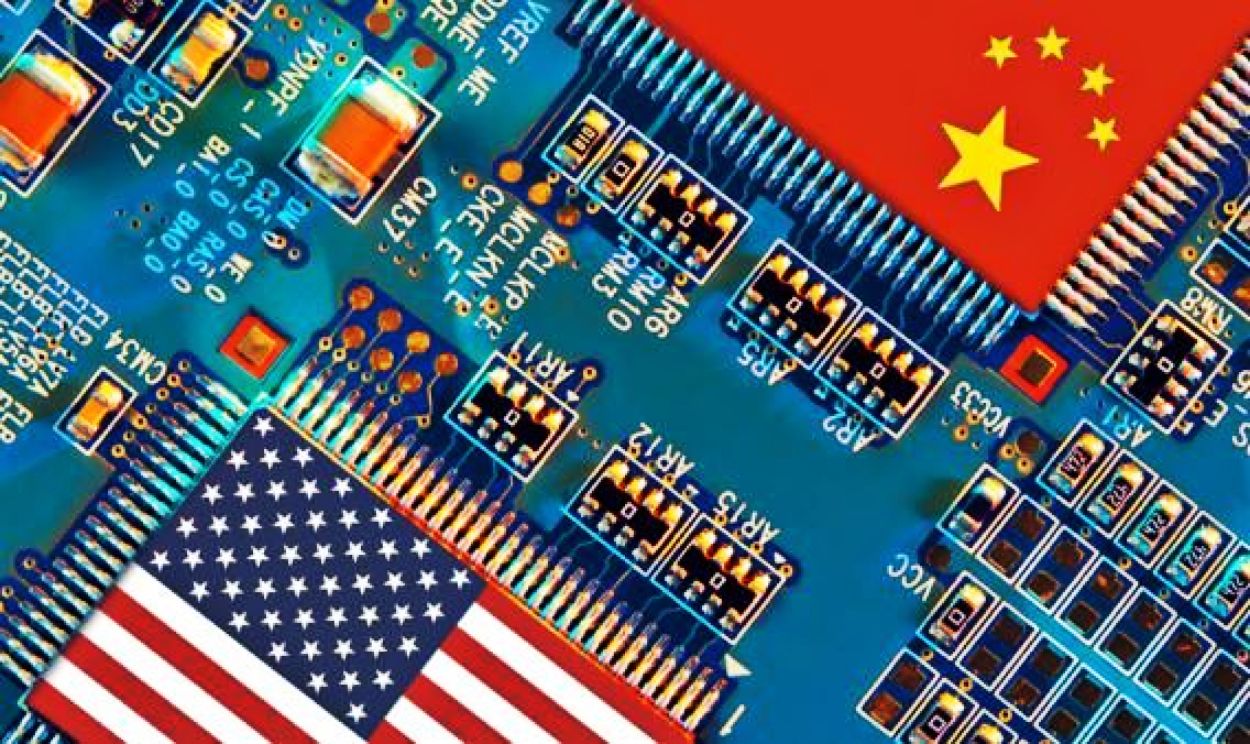US-China Tech War: $74 Billion Loss Awaits American Firms As Beijing Opts For Homegrown Software, Chips

China has taken the first official steps to completely break away from US computer software and hardware in its computers by pushing local alternatives.
According to Financial Times (FT), the new guidelines would “phase out” US microprocessors from “Intel and AMD” out of government computers and servers and replace them with “homegrown solutions.”
The new policy also goes as far as to “sideline” Microsoft’s Windows operating system and foreign-made database software in favor of domestic substitutes. At a broader level, this represents the comprehensive nature of the new Great Power Contest between the US and China, where both countries are also competing in the political, economic, technological, and military spheres.
The latest efforts to replace standard US computer software and hardware are part of a massive ‘tech war,’ during which the then-President Donald Trump administration restricted exports of microchips, semiconductor forging equipment, and other technology to Beijing.
Since then, the PRC has launched a massive indigenization drive to forge its own semiconductors, led by state-owned enterprise (SOE) Semiconductor Manufacturing International Corporation (SMIC) and other private technology companies.
As many Western media reports said, US sanctions ended up accelerating China’s chip self-sufficiency. The Communist Party of China (CPC) has invested tens of billions in state subsidies and research and development to bring it closer to forging its own chips under the 7-nm nodes.
The ‘semiconductor war’ also has a significant geopolitical overlap. The world’s largest semiconductor foundry, the Taiwan Semiconductor Manufacturing Corporation (TSMC), which has been restricted from selling chips to China, would be destroyed if Beijing decides to take the island by force and disrupt the global supply.
This is a major geoeconomic-technological calculation that shapes China’s policy on Taiwan, which still leans heavily towards “peaceful reunification.”
‘Replace US Chips, Software In Govt Computers’
According to FT, the new measures were introduced by the Finance Ministry and Ministry of Industry and Information Technology with “little fanfare” on December 26 last year. Chinese officials gradually began “following” the new “PC, laptop, and server” rules this year in what appears to be a low-key effort.
The latest measures came after Washington imposed “sanctions on a growing number of Chinese companies on national security grounds, legislated to encourage more tech to be produced in the US, and blocked exports of advanced chips and related tools to China.”
Chinese authorities have now ordered “government agencies and party organs above the township level” to include criteria requiring “safe and reliable” processors and operating systems when making purchases.
In December 2023, the China Information Technology Security Evaluation Center published its first list of “safe and reliable” processors and operating systems from Chinese companies.
Among the 18 approved processors were chips from Huawei and the state-backed group Phytium. Both are on Washington’s export blacklist. “Chinese processor makers are using a mixture of chip architectures, including Intel’s x86, Arm, and homegrown ones while operating systems are derived from open-source Linux software,” the report added.
Beijing’s procurement revamp is part of a national strategy for technological “autarky” in the military, government, and state sectors that has become known as XinChuang or “IT application innovation.” A local government IT official quoted by FT said the standards “are the first nationwide, detailed and clear instructions for the promotion of Xin Chuang.”
Likewise, SOEs were told by the State-owned Assets Supervision and Administration Commission to complete a technology transition to domestic providers by 2027. Since last year, state groups have begun quarterly reporting on their progress in revamping their IT systems, “though some foreign technology would be allowed to remain.”
US Companies Wary Of Trade War
The state-led march away from foreign hardware will dent US companies in China, starting with the world’s dominant PC processor makers, Intel and AMD. Last year, China was Intel’s largest market, providing 27 percent of its $54 billion in sales and 15 percent of AMD’s $23 billion in sales.
Microsoft did not break out China sales, but President Brad Smith told the US Congress last year that the country provided 1.5 percent of its revenues. Microsoft and Intel declined to comment.

Previous reports have noted how American technology and computer hardware companies have been averse to the geopolitical rivalry with China, citing business interests. In July last year, the Semiconductor Industry Association (SIA) said that further steps by the Biden administration “could backfire,” according to a report on the South China Morning Post (SCMP).
“Allowing the industry to have continued access to the China market, the world’s largest commercial market for commodity semiconductors, is important to avoid undermining the positive impact of (the Chips and Science Act),” SIA said in a statement.
In October 2023, the New York Times (NYT) reported that American chip companies “have pushed back with a blunt warning,” saying cutting sales to China “would gut their businesses and derail the administration’s plan to build new semiconductor factories in the United States.”
“Since July, Nvidia, Intel, and Qualcomm, three of the world’s largest chip makers, have pressed their case that cracking down on China would have unintended consequences.
They have challenged the White House’s national security wisdom in meetings with officials like Secretary of State Antony J. Blinken and Commerce Secretary Gina M. Raimondo, wooed think tanks, and urged leaders across Washington to reconsider additional chip controls, according to interviews with two dozen officials across the government, industry, and policy organizations,” NYT said.
- Questions and Answers
- Opinion
- Motivational and Inspiring Story
- Technology
- Live and Let live
- Focus
- Geopolitics
- Military-Arms/Equipment
- Seguridad
- Economy
- Beasts of Nations
- Machine Tools-The “Mother Industry”
- Art
- Causes
- Crafts
- Dance
- Drinks
- Film/Movie
- Fitness
- Food
- Juegos
- Gardening
- Health
- Home
- Literature
- Music
- Networking
- Other
- Party
- Religion
- Shopping
- Sports
- Theater
- Health and Wellness
- News
- Culture

